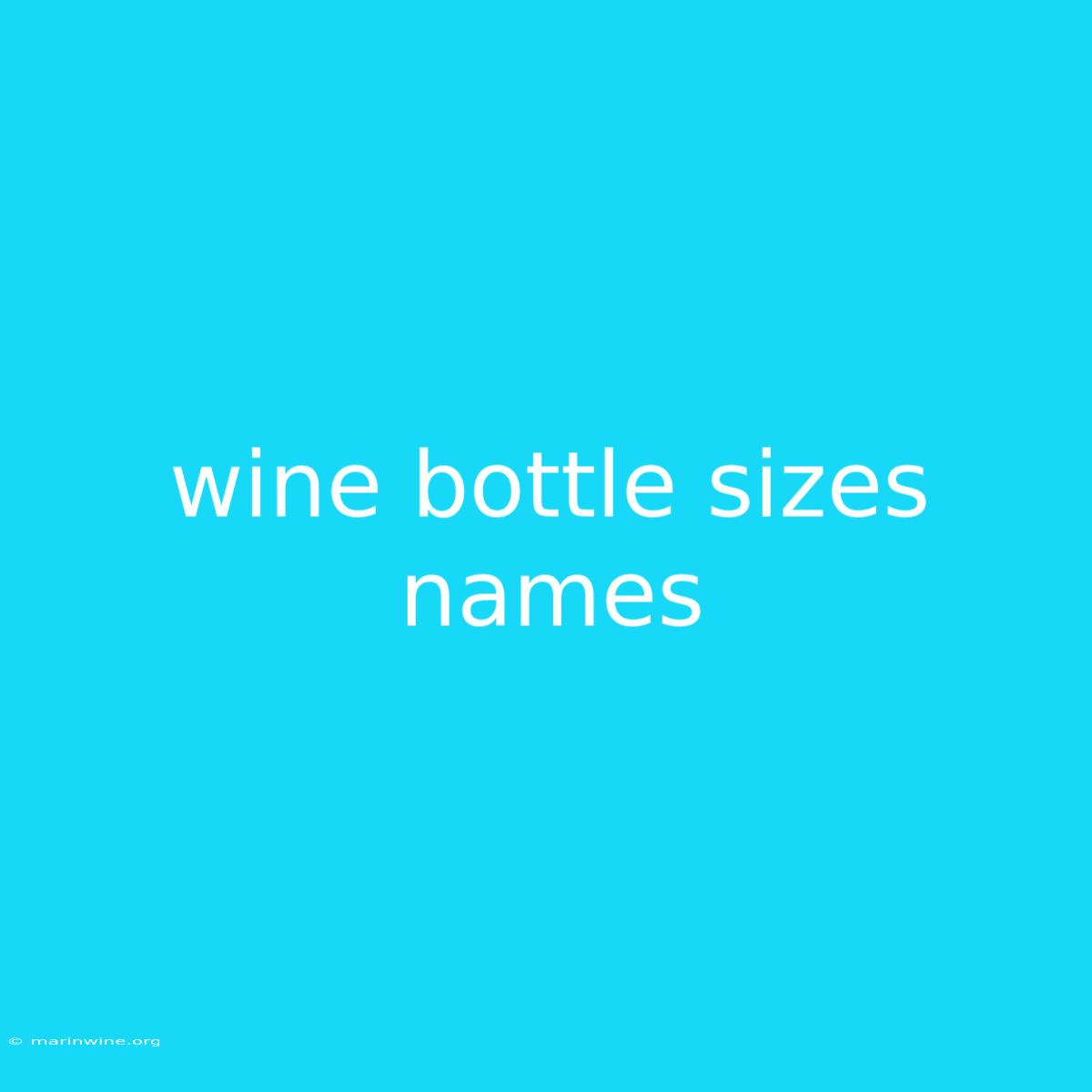Uncorking the Mystery: A Guide to Wine Bottle Sizes and Their Names
Have you ever wondered why some wine bottles seem bigger than others? It's not just your imagination; the world of wine boasts a fascinating array of bottle sizes, each with its own unique name and purpose.
Why It Matters: Understanding wine bottle sizes can be a game-changer for wine enthusiasts. From choosing the right bottle for a special occasion to deciphering the information on a wine label, knowing the different sizes allows you to make informed decisions and appreciate the nuances of wine consumption.
Key Takeaways of Wine Bottle Sizes:
| Bottle Size | Name | Volume (mL) | Notes |
|---|---|---|---|
| Smallest | Piccolo | 187 | Perfect for single servings or tasting |
| Small | Demi | 375 | Ideal for a couple or a light meal |
| Standard | 750 | 750 | The most common size for wine bottles |
| Large | Magnum | 1500 | Suitable for parties or gatherings |
| Larger | Jeroboam | 3000 | A large bottle for special occasions |
| Largest | Melchior | 4500 | Holds the equivalent of six standard bottles |
Wine Bottle Sizes Explained
The Standard: 750ml Bottle
The standard wine bottle, commonly known as a "750ml" bottle, is the most widely recognized and consumed size worldwide. This size is ideal for a dinner for two or a small gathering.
Key Aspects of the Standard Wine Bottle:
- Volume: 750 milliliters (mL)
- Shape: A classic, cylindrical shape with a slightly wider bottom
- Closure: Typically corked
- Usage: The most versatile and widely used size, suitable for both red and white wines.
Magnum: The Party Bottle
A magnum is a large wine bottle holding twice the amount of a standard bottle, which is 1500 mL. The larger size allows for a longer aging process and helps preserve the quality of the wine.
Key Aspects of the Magnum Bottle:
- Volume: 1500 milliliters (mL)
- Shape: Similar to a standard bottle, but longer and with a wider base
- Closure: Usually corked
- Usage: Ideal for parties, gatherings, and special occasions.
Beyond the Basics: Exploring Rarer Sizes
Beyond the standard and magnum, a fascinating array of larger bottle sizes awaits, offering an intriguing journey into the world of wine.
Jeroboam (3 liters): This bottle holds the equivalent of four standard bottles, often used for celebratory events and special vintages.
Rehoboam (4.5 liters): Holding the equivalent of six standard bottles, the Rehoboam is an impressive bottle size, typically seen in high-end restaurants or for grand occasions.
Melchior (6 liters): This impressive bottle holds the equivalent of eight standard bottles, a true testament to the scale of large-format wine production.
Further Analysis of Rare Wine Bottle Sizes:
- Rarity: These large bottle sizes are relatively uncommon compared to standard and magnum bottles.
- Cost: The cost of larger bottle sizes is typically significantly higher than standard bottles.
- Storage: Proper storage for these large bottles is crucial to maintain the quality of the wine.
Information Table: A Visual Guide to Wine Bottle Sizes
| Bottle Size | Name | Volume (mL) | Equivalent Standard Bottles |
|---|---|---|---|
| Piccolo | Piccolo | 187 | 0.25 |
| Demi | Demi | 375 | 0.5 |
| Standard | 750 | 750 | 1 |
| Magnum | Magnum | 1500 | 2 |
| Jeroboam | Jeroboam | 3000 | 4 |
| Rehoboam | Rehoboam | 4500 | 6 |
| Melchior | Melchior | 6000 | 8 |
FAQ about Wine Bottle Sizes
Q: Why are there different wine bottle sizes? A: Different bottle sizes serve various purposes, from single servings to large gatherings and special occasions.
Q: Do larger wine bottles age better? A: Generally, larger bottles provide a larger surface area for the wine to interact with air, potentially leading to a slower and more controlled aging process.
Q: Are larger wine bottles always better? A: Not necessarily. While larger bottles may offer a longer aging potential, they can also be more expensive and require specialized storage. The ideal size depends on your needs and preferences.
Q: Can I find wine in all bottle sizes? A: While the standard 750mL bottle is the most common, some wineries offer their wines in different sizes, including magnums and larger formats.
Tips for Wine Bottle Sizes:
- Consider the occasion: Choose a size that suits the number of people you are serving.
- Think about storage: Larger bottles require more space and proper storage conditions.
- Look for variety: Not all wines are available in all sizes.
- Enjoy the experience: Each bottle size offers a unique experience, so savor the different formats.
Summary of Wine Bottle Sizes
This comprehensive exploration has delved into the fascinating world of wine bottle sizes. From the standard 750mL bottle to the impressive Melchior, each size offers a unique experience and adds to the rich tapestry of wine culture. By understanding the different sizes, you can choose the perfect bottle for any occasion, enjoy a wider range of options, and deepen your appreciation for the art of wine.
Closing Message: The next time you encounter a wine bottle, take a moment to appreciate its size and the history behind it. Explore the different formats, and let your curiosity guide you into a deeper understanding of the world of wine.

